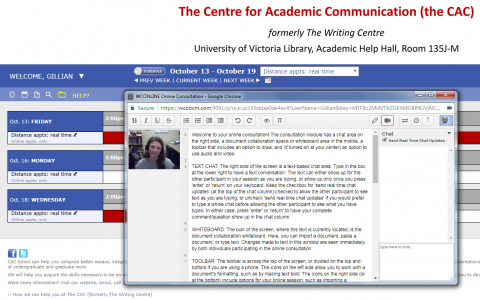By Gillian Saunders

“Are you a distance student”? If you’ve been on the CAC’s tutorial booking site, WCONLINE, in the past year, you might have noticed this question on the landing page. The CAC has been offering distance help for a few years now, but the procedure for booking has changed a bit recently, and “real time,” or “synchronous” options are also now available: you can now “meet” with a tutor via phone, Skype, or WCONLINE’s online meeting space. I’ve been the main distance tutor for over two years now, and it’s been an interesting journey and one of the most rewarding parts of my work at the CAC. What follows is a few details about distance tutoring, my experiences as the distance tutor, and some specific information on how the distance tutoring works.
When I was offered the opportunity to take over the Centre for Academic Communication’s distance tutoring two years ago, I didn’t hesitate. Working in my pajamas?! Yes, please! The number of students in distance programs is constantly growing, and I wanted to try a few new things. We decided to keep the twc@uvic.ca email account that we were currently using for quick questions and returning feedback, but moved bookings to https://uvic.mywconline.com/, and set up a schedule for synchronous meetings. At present, UVic is one of only a handful of Canadian universities to offer real-time options for distance tutoring.
In spite of common perceptions that email interactions with distance tutors are one-sided and limited in what they can accomplish, I’ve found mostly the opposite. Distance tutoring does, in some very useful ways, actually exceed some of the limitations of face-to-face sessions. With any of the real-time distance options, and also with the written feedback option, students have a record of their interaction with the tutor, whether it’s the chat interaction in WCONLINE or a recording of a phone or Skype conversation. I can recommend links to helpful resources and websites, and these can easily be revisited later at the student’s convenience.
Although we do try to limit the distance appointments to students who really can’t make it to campus to see one of our tutors in person, we feel strongly that academic communication support should be accessible to all, for whatever reason. Are you on co-op? Working during CAC hours? Have small children at home? Distance tutoring is here for you. There is also evidence that distance tutoring may be especially useful for students with writing anxiety or disabilities. Distance tutoring makes both the writer and the tutor “invisible,” to a certain extent. Perhaps there are some cases when it’s best to focus on the writing itself – to take the focus off the writer altogether and work on the product instead. I have worked with students with physical and mental health issues, learning disabilities, and vision impairment, and students calling from rural Alberta in the parking lot of a motel. I’ve also received writing from students that is intensely personal. Maybe you’d rather not work on a personal reflection piece about your experience with depression or sexual abuse with someone face-to-face? Distance tutoring is here for you, too.
If you do need to use our distance tutoring options, there are a couple of things you can do to get the most out of your session. First, if you’re requesting written feedback, picture a human on the receiving end of your appointment. Talk to me! You can use the comments function to ask questions in the margins of your work. Some common questions that might be easily resolved this way include, “Is this sentence too long?” “Do I need a transition here?” and “Does this information fit better in this paragraph or the previous one?” Next, include whatever instructions or guidelines you might have, and any relevant background that I might need in order to understand what you’re trying to accomplish. If you only need help with one section, highlight that section, or let me know that you haven’t written the introduction yet, so that I don’t wonder where that is. If you’ve received any previous feedback from an instructor and you’re working on improving a specific aspect of your writing, that’s useful to know, too. Keep in mind that appointments are meant to last as long as our face-to-face options: that’s 30 minutes for one slot, or 60 for two that are booked together.
Finally, give yourself enough time to make revisions and possibly get a second round of feedback, if necessary. Many students find it useful to get some written feedback first, make revisions, and then follow up with a phone or Skype appointment to get clarification, ask questions, and confirm revisions. If your assignment is due Friday, you’ll need to submit it by Tuesday afternoon in order to be guaranteed written feedback by the end of the day on Thursday. Don’t wait until the last minute! Revisions often take longer than you think they will. Remember that we’re not an editing or proofreading service, so no changes will be made for you. That doesn’t help you become a better writer or a more effective editor of your own work.
At the end of last term, I asked some of UVic’s distance students about their experiences using our distance services, and the feedback was overwhelmingly positive. Although most indicated that they would rather meet in person if this were possible, they also thought they had been able to get what they needed from the distance tutoring options. After having helped almost 200 students via our online tutoring options over the last year, up from almost 140 in the previous year, I can only imagine and hope that the number of distance tutoring users will continue to grow. Face-to-face and distance tutoring have the same goal of helping students to become better writers. Both methods can achieve this goal, I believe, if they are managed thoughtfully and used with a good understanding of their possibilities and limitations.
If you have any questions or concerns about distance tutoring and what it can do for you, please email twc@uvic.ca.
